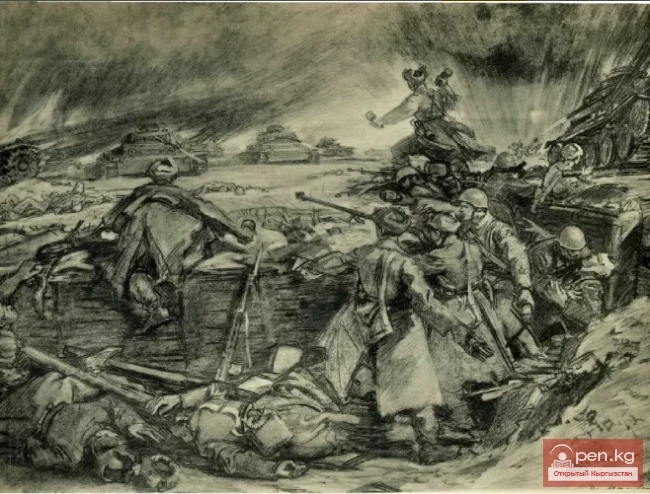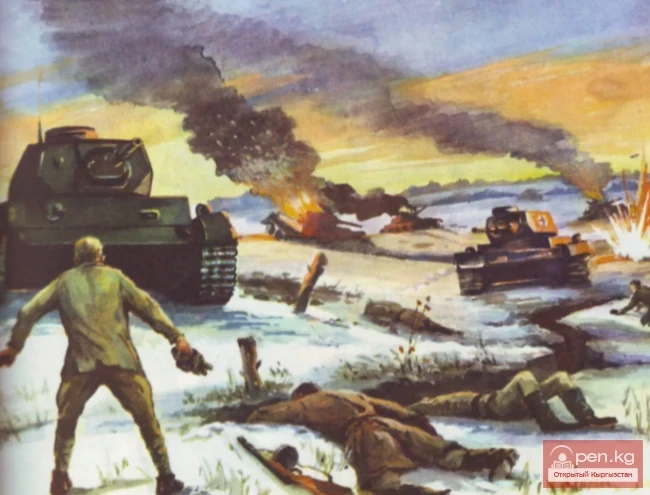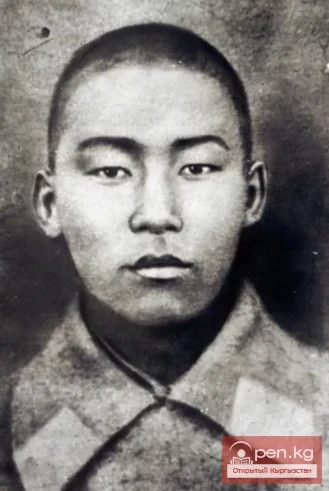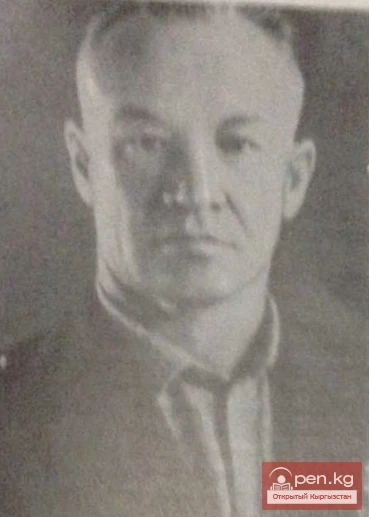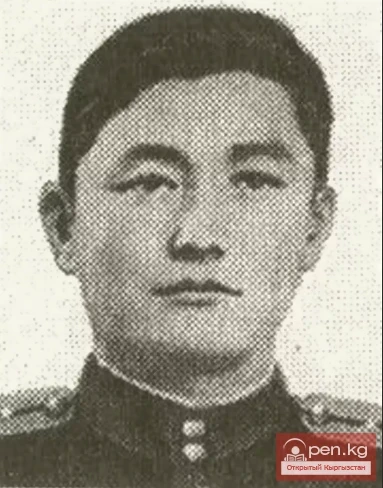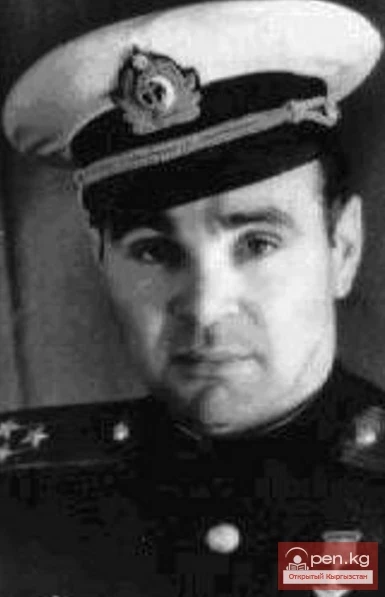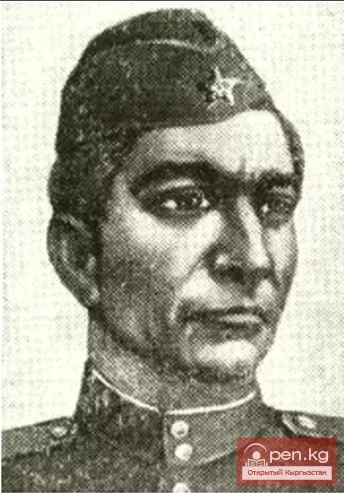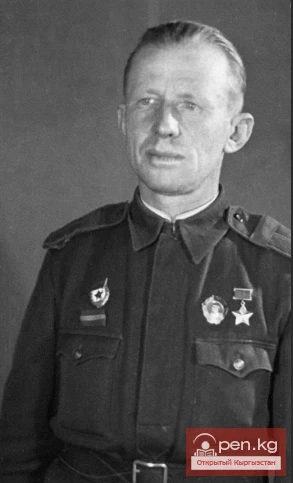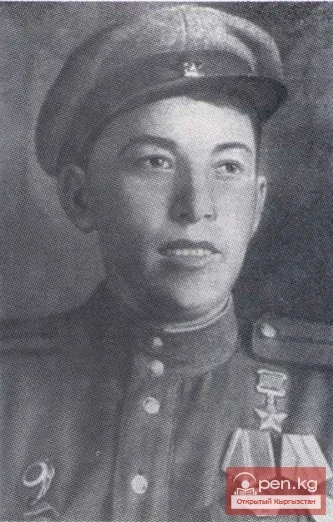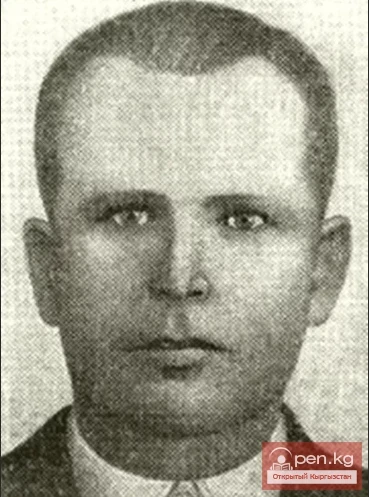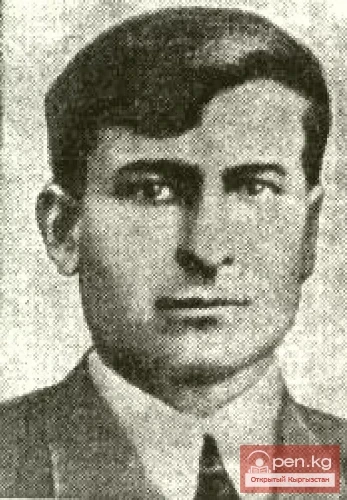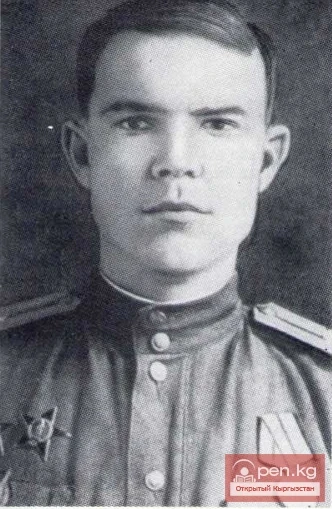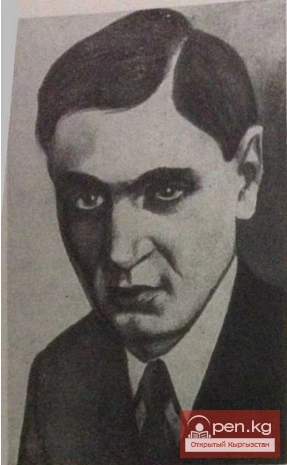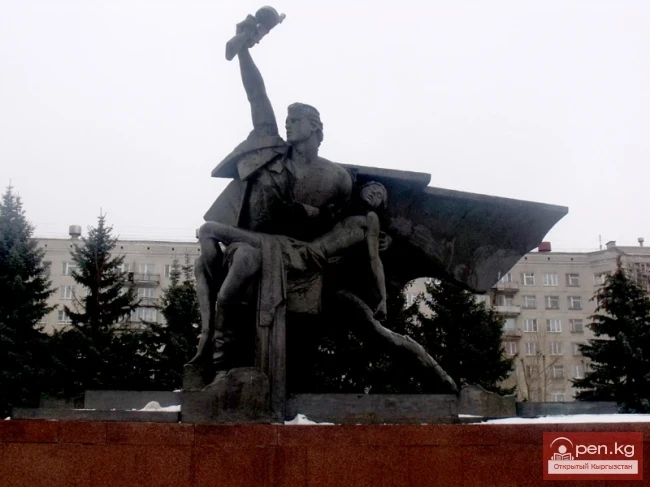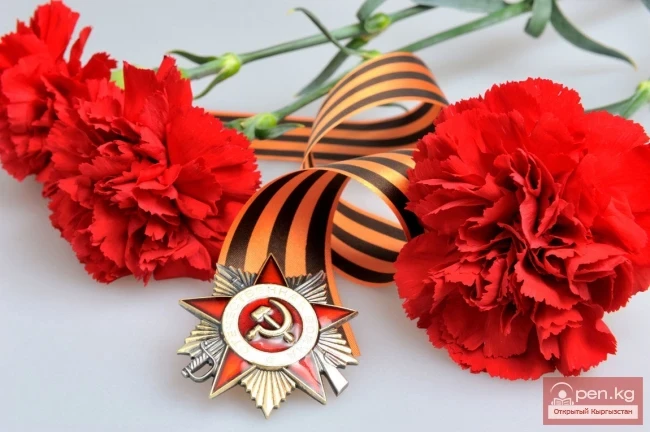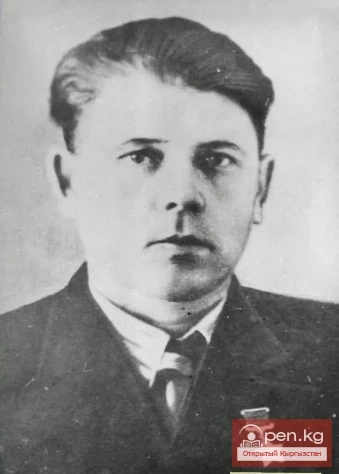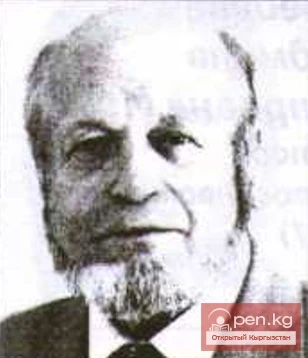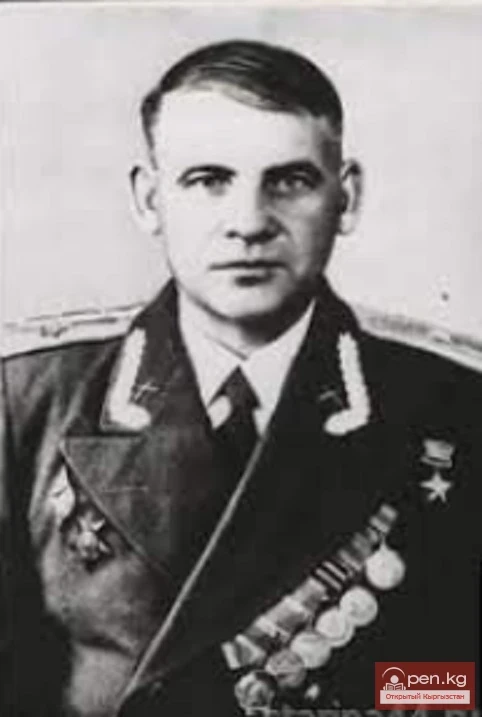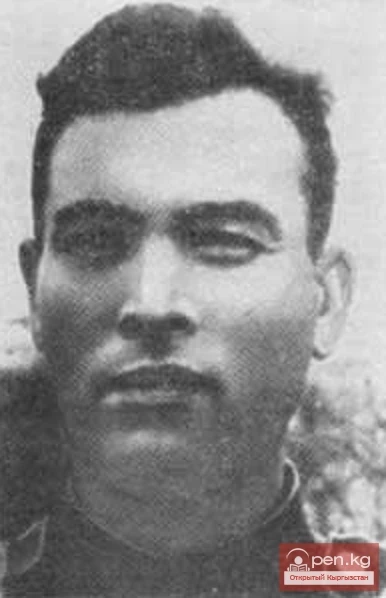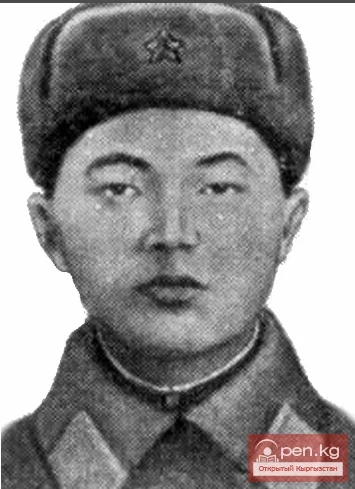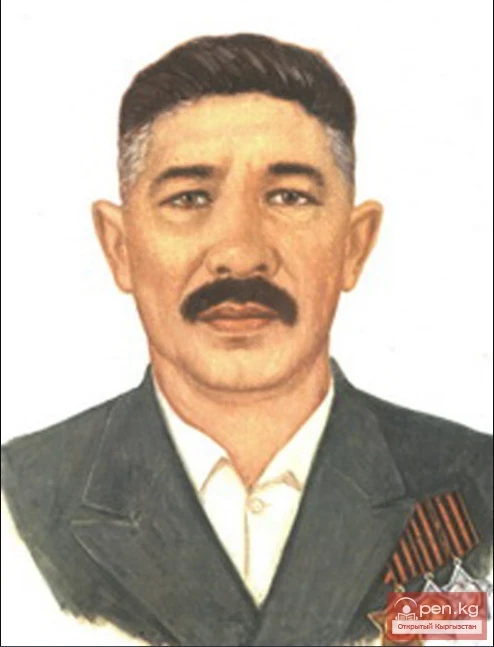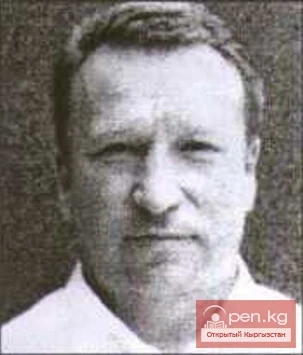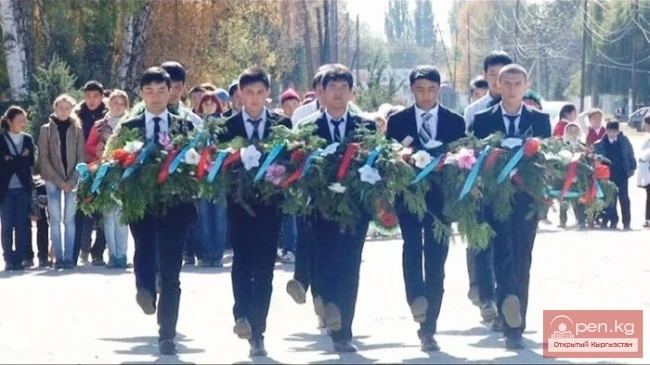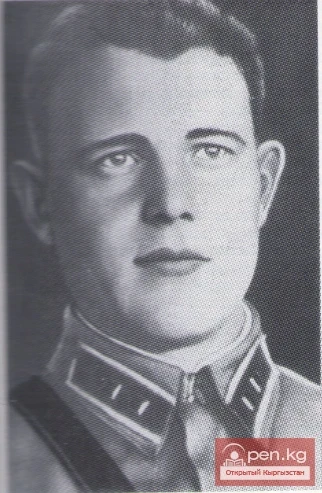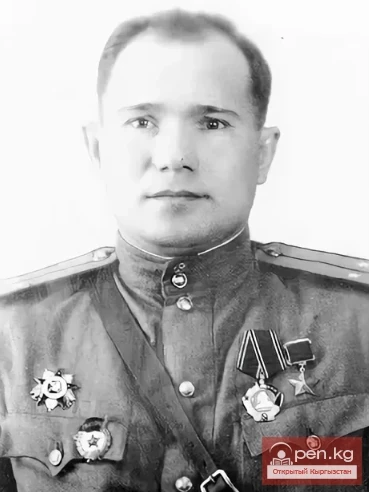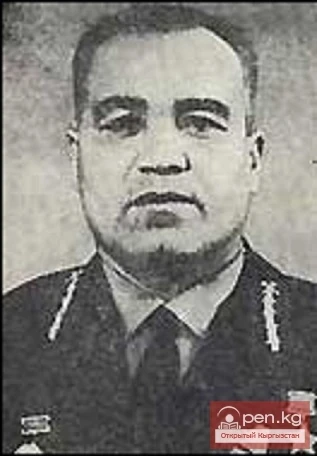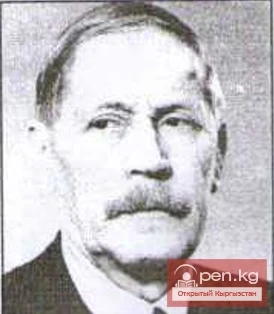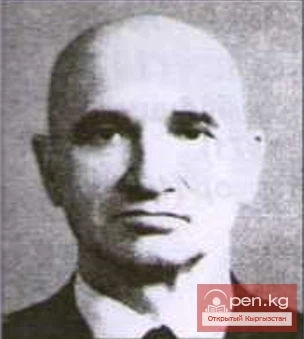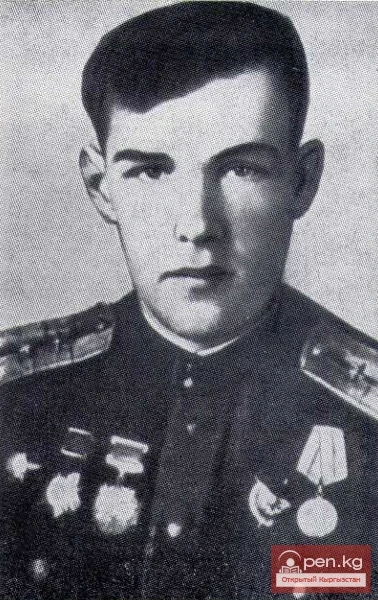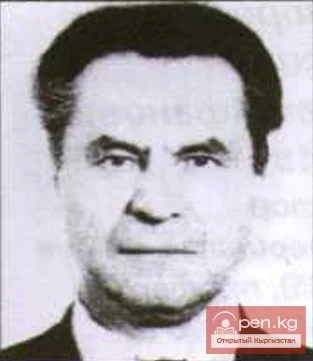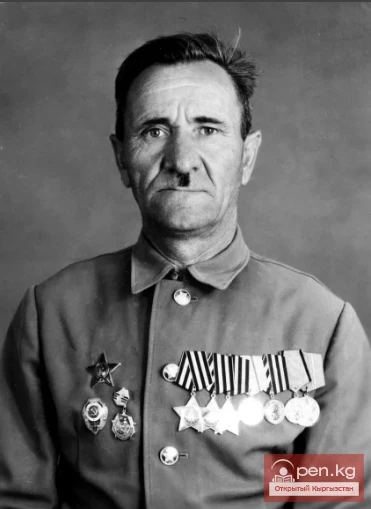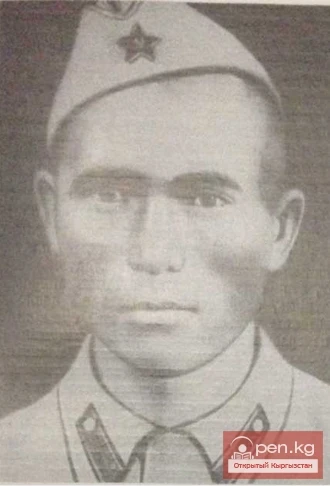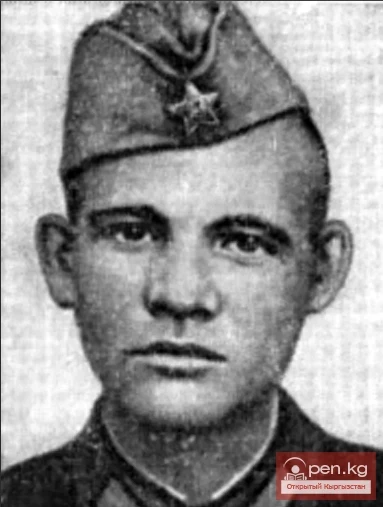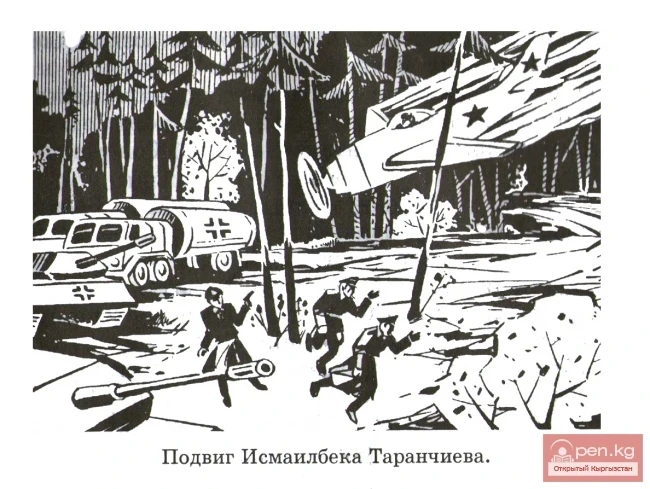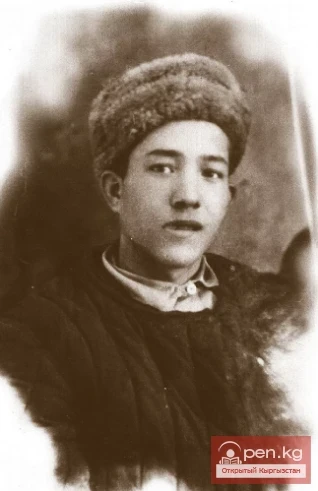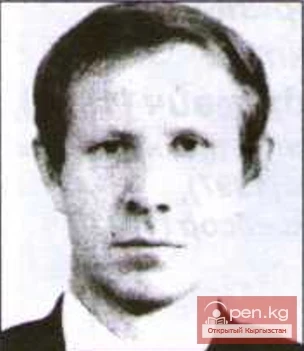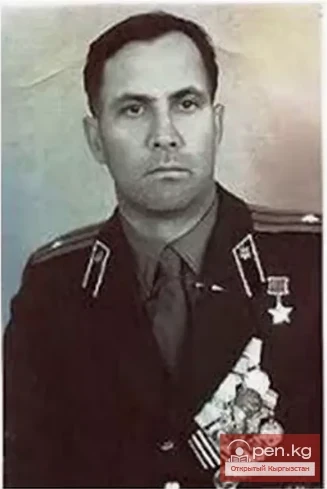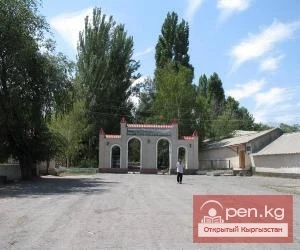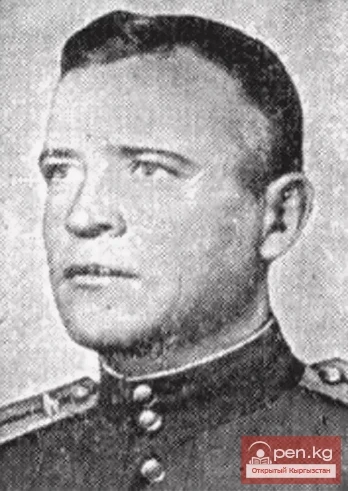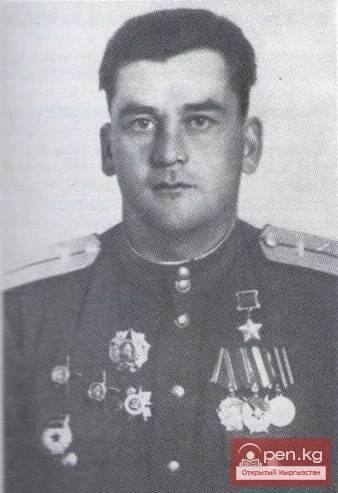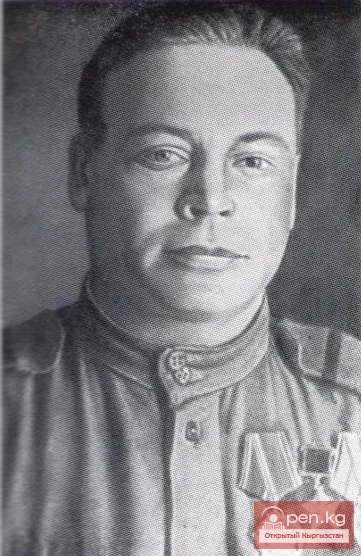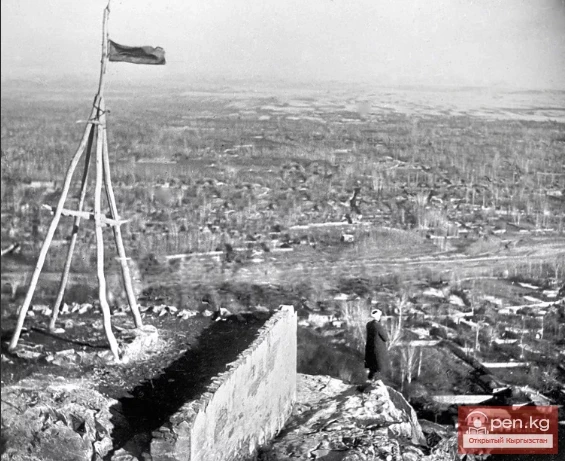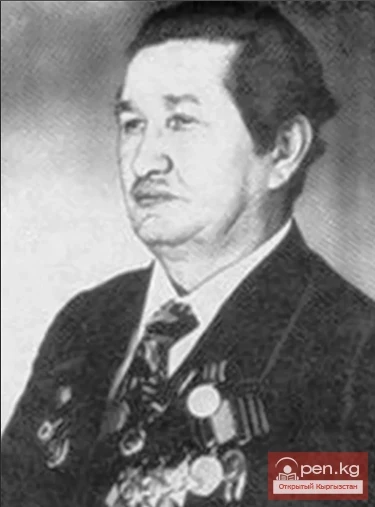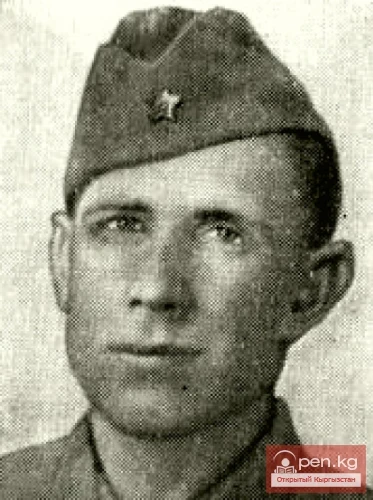
Hero of the Soviet Union Ananyev Nikolai Yakovlevich
Nikolai Yakovlevich Ananyev (1912—1941) — Red Army soldier, private rifleman of the 4th company of the 2nd battalion of the 1075th rifle regiment of the 316th rifle division of the 16th Army of the Red Army on the Western Front, Hero of the Soviet Union (1942).
He was born in 1912 in the village of Sazanovka, Przhevalsky district, Semirechye region of the Turkestan General Governorate of the Russian Empire (now — the village of Ananyev, Issyk-Kul district, Issyk-Kul region, Kyrgyz Republic) in a peasant family. Russian. He received primary education at a village school. Before the Great Patriotic War, he worked in a local collective farm.
In July 1941, he went to the front and was assigned to the 316th rifle division. Private. Rifleman. He fought near Moscow as one of the 28 Panfilov heroes, defending the approaches to the capital in the area of the Volokolamsk highway.
For his displayed bravery, courage, and heroism, he was posthumously awarded the title of Hero of the Soviet Union on July 21, 1942.
N. Ya. Ananyev and his combat comrades are buried on the outskirts of the village of Nelidovo, one kilometer from the Dubosekovo railway station.
The memory of the Hero has been immortalized. A village named after him was established where he was born and lived, and a street in this village was named after him, along with the creation of a museum. A bust has been installed at the building of the "May 1" collective farm in the Issyk-Kul district against the backdrop of a mosaic panel depicting the feat of the 28 Panfilov heroes. In the city of Bishkek, on the "Young Guard" Avenue in the Alley of Heroes, a bust has been erected.
Nikolai Ananyev, like his peers from the village of Sazanovka, could hardly read Suvorov's aphorisms about the heroism and courage of the sons of the Fatherland; he had heard of Kutuzov, Nakhimov, and other commanders who instilled in soldiers the readiness for feats in the name of their native land and people — in that Sazanovka, a village library was just beginning to be formed. And when would he have time to read — his father, who had fought in the imperialist war and for Soviet power, died of typhus, and soon, due to illness, hardships, and unbearable labor, his mother’s heart ceased to beat. Six orphans were left, with Nikolai being the fourth in the family. He had to help his sisters, both older and younger. This was also a test of strength.
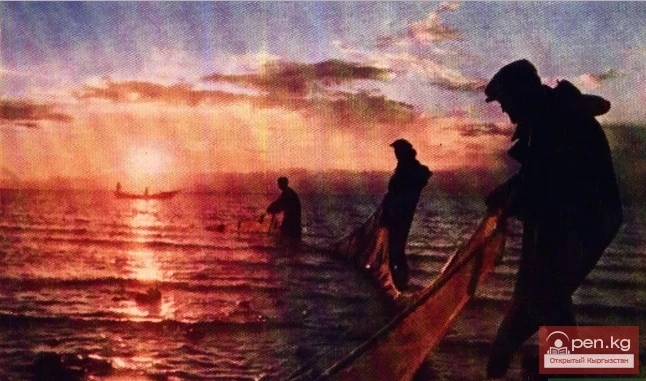
In the autumn, winter, and early spring, Nikolai would go fishing for carp and whitefish on a boat from the fishing collective farm "Issyk-Kul," and, as his fellow villagers say, he never returned from the lake without a catch. How many times he had to withstand the onslaught of icy waves, stormy winds, and miraculously remain alive. This is how Nikolai is remembered by his fellow villagers. And as veteran Panfilovets Alexey Trofimovich Lutoshkin recalls, who, along with Ananyev, was among the first recruits from Sazanovka to set off in July '41 on a steamboat to Rybachy, also with a knapsack on his back, Nikolai Ananyev was modest, hardworking, and courageous. When his older brother Ivan, seeing Nikolai off, asked, "Will it be hard at war — will you manage?", he replied with a smile, "Don't you believe in me? Don't worry, I'll hold out... We'll return from the war, summarize our conversation. Until we meet again, Vanya!..”
The brothers never met again — both perished defending the country from the fascist invasion.
And yet, this conversation is still remembered by the villagers. And I thought: the short, farewell conversation for the "quiet" Nikolai Ananyev was also one of the sources of his immortal feat. Yes, he never even finished the seven-year school, but films like "Chapaev," "We Are from Kronstadt," "Tractor Drivers" were already being shown, songs about Katyusha and the three tankmen were sung, the radio reported on Chkalov's flight with his comrades over the North Pole to America, and the labor feat of Alexey Stakhanov and Pasha Angelina. And, admiring the biographies of heroes, a simple peasant boy from Sazanovka absorbed both the heroism of pre-war everyday life and the meaning of life, and the readiness for feats in the most difficult times for the country.
As they saw off husbands, sons, brothers to the Red Army, wives, mothers, and sisters sat on tractors, went behind the plow, plowed, sowed, and harvested grain for the front and Victory, knitting socks and mittens for the front-line soldiers at night by the light of oil lamps.
Maria Mikhailovna Kuzina became the first female tractor driver in Sazanovka. Others followed her...
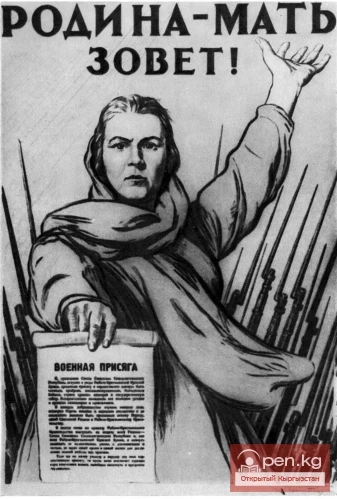
Nikolai Ananyev never thought of becoming a hero crowned with the "Golden Star." But he was ready to defend his Motherland, his people, to defend the world in which people in Kyrgyzstan and near Moscow, in Belarus and the Far East were just beginning to live better — in the vast country that was gaining strength for industrialization and collectivization, to break free from the shackles of the past — poverty, hunger, illiteracy, so that a person from Moscow to the very outskirts could walk on his land as a master, a creator of a new world. The peasant boy from Sazanovka wanted to do many good things in his lifetime.
So thought Nikolai Ananyev, as well as his peers, when they sailed on a steamboat following the sun across Issyk-Kul, sometimes blue, sometimes pink-red, sometimes purple-green, kind and gentle. Somehow, it was hard to believe that the fascists were bombing the cities and villages of Ukraine, Belarus, breaking into Crimea and Murmansk. Who needed the land of the Motherland, and who found the Soviet Country so unpalatable? Fascism and its nannies, whether Chamberlain, Hindenburg, or Krupp — there are too many to list. But now, Nikolai Ananyev, already a soldier and defender of his native land, as part of a squad, platoon, company, battalion, regiment, division, and the entire Red Army, had to stop this march of the ominous plague.
To stop, to drive away... Yes, this is what the sons of the Fatherland believed and hoped for with their mighty strength, the people believed as they sent fathers, husbands, and sons to the front with tears. After a month or two of training in the formation areas, they continued their studies in the trains in the frontline zone. Later, already near Moscow, Nikolai Ananyev, always silent and thoughtful, would say to his comrades: "It's good that we have General Panfilov as our commander. Our military commissar, a Chapaev man..."
In July 1941, Ananyev N. Ya. was drafted by the Issyk-Kul District Military Commissariat of the Issyk-Kul Region of the Kyrgyz SSR into the Workers' and Peasants' Red Army (RKKA) — a Red Army soldier, private infantryman of the 316th infantry division (316 SD), formed in Alma-Ata under the command of Major General I. V. Panfilov (previously the military commissar of the Kyrgyz SSR). In August 1941, as part of the division's personnel, he was sent to the Western Front near Novgorod at the disposal of the planned formation of the 52nd reserve army; on August 27, 1941, the division completely unloaded in Borovichi, and by September 8, 1941, the division occupied positions in the second echelon of the army and for almost a month the division equipped a defense line.

The origins of the feat... How to determine where they begin and at what point in life a person reveals their heroic spiritual and physical strength.
Nikolai Ananyev never thought of becoming a hero crowned with the "Golden Star." But he was ready to defend his Motherland, his people, to defend the world in which people in Kyrgyzstan and near Moscow, in Belarus and the Far East were just beginning to live better — in the vast country. The peasant boy from Sazanovka wanted to do many good things in his lifetime. And he, Nikolai Ananyev, now a soldier and defender of his native land, as part of a squad, platoon, company, battalion, regiment, division, and the entire Red Army, had to stop this march of the ominous plague. To stop, to drive away...
No one in the division, except for the commander and his staff, knew, and even less understood, why suddenly the 316th was being transferred from Novgorod to Moscow. Without weakening resistance to the enemy on the Leningrad front, it was necessary to strengthen the defense of Moscow.
On October 6, 1941, the 316th SD was loaded into trains and transferred to Moscow, at the disposal of the commander of the Moscow Military District, where it occupied the Volokolamsk fortified area; the commander of the 316th SD, Major General I. V. Panfilov, was appointed head of the Volokolamsk combat area; on October 13, 1941, the 316th SD entered the newly formed 16th Army of the Western Front. It occupied a defense line stretching 41 kilometers from the settlement of Lvovo to the Bolychevo state farm... Nikolai Ananyev, as a soldier should, dug trenches, communication trenches, built dugouts and bunkers. The single-echelon defense line assigned to the 316th SD became the very line along which on October 15, 1941, German troops consisting of the 106th and 35th infantry divisions of the Wehrmacht, as well as three tank divisions: the 2nd, 5th, and 11th divisions began their offensive, continuing the "Typhoon" operation to capture Moscow: the main blow was dealt along the Volokolamsk highway by the 2nd tank division.
On November 16, 1941, on the defense line — at the Dubosekovo railway junction in the Volokolamsk district of the Moscow region, the 316th SD was engaged in fierce defensive battles. That day, each of the guardsmen, in the smoke and flames of battle, firmly feeling the elbow of a comrade, looked not into the eyes of death but into the eyes of the hated enemy and at the fire-spewing barrels of tank guns. The steel of the Germans was coming in an avalanche.
Morning. A cold, biting wind swept across the field, swirling the snow. Shivering from the frost, the soldiers strained to look towards the enemy. Enemy planes swooped down on the positions of the rifle platoon. Following them, artillery and mortars unleashed fire on the trenches. After the shelling, enemy infantry moved forward.
The fascists, confident that after such fire no one was left alive, attacked in close ranks, standing tall. When the enemy approached the trenches, the machine guns opened fire. The fascists could not withstand it.
Stunned by such an unexpected blow, they fled, leaving dozens of dead on the battlefield.
But this was just the beginning. Tanks moved into the attack. The roar of engines, the clanking of tracks, the howling of shells... Bottles of incendiary mixtures, bundles of grenades flew at these armored monsters... Soot, fire, smoke, and blackened snow, the earth heaved. For four hours, a firestorm raged over the trenches of the 4th company. The day was drawing to a close. In the haze of the approaching twilight, the rumble of tank engines was heard again.
This fierce struggle against the enemy and the steadfast courage of the Soviet soldier ended in a victory of spirit and strength for those like Nikolai Ananyev — sons of our multinational Motherland.
Documents, facts... What was seen and experienced... The soldiers defending the line at Dubosekovo were running low on ammunition. But the fascists kept coming — with steel, with fire... One attack was drowned, the second was repelled.
At what moment and after which of his comrades did Nikolai Ananyev fall heroically, it is hard to say — there was no time to keep track of such details in battle. But they held out and did not give the enemy a path to Moscow, giving their lives. What was Nikolai Ananyev thinking in those moments? Probably about his native Sazanovka, about his sisters, about the blue Issyk-Kul, about life and human happiness. He never got to express these thoughts and feelings aloud — the roar of battle and the clashing of metal sealed his lips.
Red Army soldier of the 4th company of the 2nd battalion of the 1075th rifle regiment of the 316th SD — private Nikolai Ananyev, as part of a group of anti-tank fighters — during a protracted battle, repelling tank attacks from the enemy with 50 tanks, holding back the enemy advance for 4 hours, and destroying 18 enemy tanks and several hundred enemy soldiers — fell heroically, among other Red Army soldiers who perished, heroically fulfilling their military duty, standing in the way of the advancing enemy troops towards Moscow. This feat of the Soviet warriors entered history as the legendary feat of the 28 Panfilov heroes.
Ananyev N. Ya. was initially buried in the Moscow region, at the Dubosekovo railway junction. On August 12, 1942, he was reburied in a mass grave: Moscow region, Volokolamsk district, Chisminsky rural settlement, village of Nelidovo.

By the decree of the Presidium of the Supreme Soviet of the USSR dated July 21, 1942, Red Army soldier Ananyev N. Ya. was posthumously awarded the title of Hero of the Soviet Union for exemplary performance of combat missions from the command at the front in the fight against the German-fascist invaders and for the courage and heroism displayed during this.
Awards
Gold Star medal (July 21, 1942)
Order of Lenin (July 21, 1942)
Hero of the Soviet Union — the highest title of the USSR: awarded for performing a military feat (1942, posthumously).
Memory
In honor of Nikolai Ananyev, his native village — Sazanovka was renamed Ananyev, where a street was named after him, a monument was erected, and a museum was created. His name was also given to a vessel of the Ministry of the Merchant Marine.
